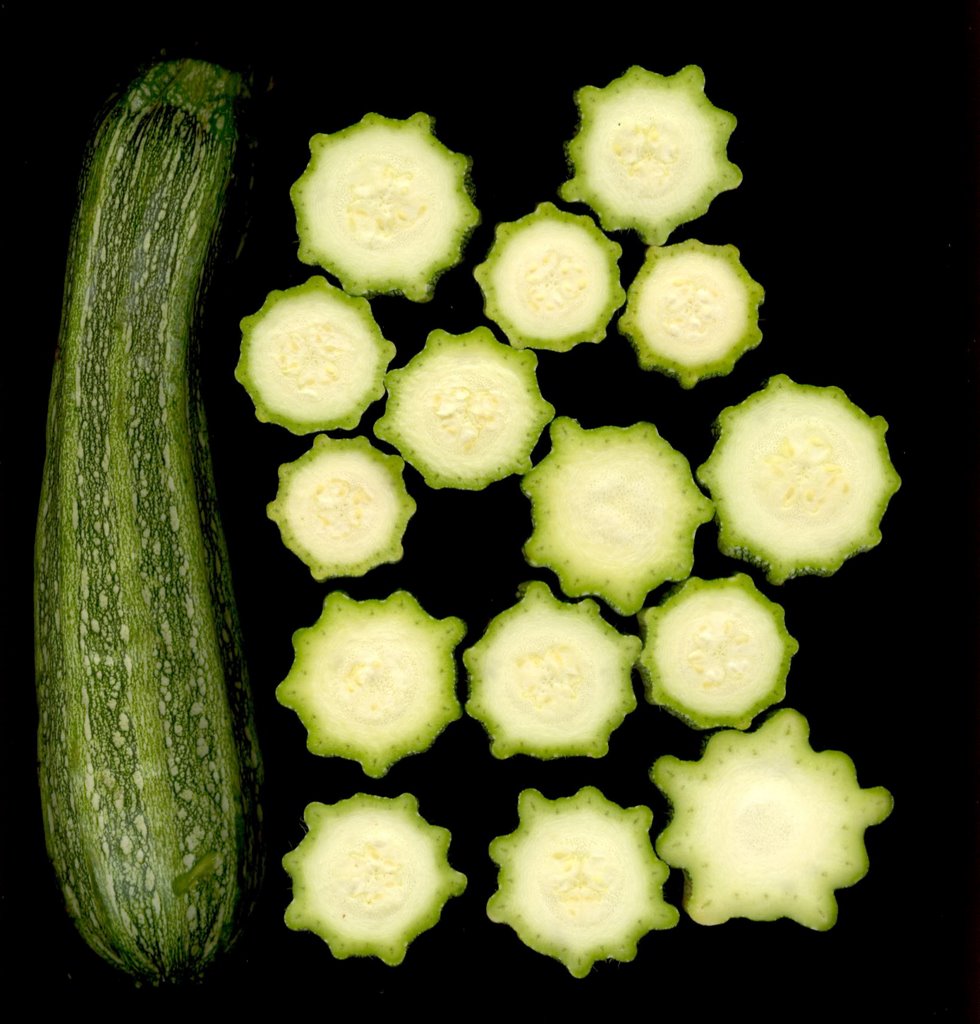Ridges

I could almost repair my bicycle with these guys, couldn't I? I am loving the little stars formed by the ridges of this squash, identified by Elizabeth Schneider as Costata Romanesca, of the cocozelle variety of zucchini, but what really bakes my potatoes is the pattern of pale yellow speckles on the dark green skin. How do they manage to get every speckle in exactly the right spot? Surpassing wondrous are the works of the Lord.
These ridgey squashes are firmer that your garden variety zucchini, and they also have more liquid, so they will appreciate draining with some kosher salt before cooking. This batch will be going into the season’s second ratatouille. The recipe is pretty close to the one posted here. The only innovation for this year is that I am using the teeny tiny little garlic cloves from the tops of mature garlic scapes and leaving the cloves whole.
More shapely variation at Sweetnicks.
Zucchini are one of the five foods mentioned in the Talmud (Horayos 12a and Kerises 6a) as being auspicious for the Eve of the New Year. A possible reason for this suggested by Hai Gaon (939-1038) is that it is because the word for zucchini in Aramaic (or the word for what we understand to have been something pretty close to zucchini) is “קרא” or “kra,” a homophone for the word meaning to rip, and when eating the zucchini one can say prayer “May the evil decree be ripped away from us.” So the symbolic power of the vegetable is located in the word. You can see how this is just my cup of tea—the vegetables, along with the words of the blessing, go into the mouth.
There’s more—the Mordecai (?-1298) believed that the reason this vegetable was especially recommended for the New Year was because kra is also a homophone for the word meaning to read, and the appropriate blessing to recite is “May our merits be read before you.” So they agree that the culinary lexicography is the issue, but disagree on what the word evoked by zucchini might be.
The Yiddish commentary by Rabbi Avrohom Karp zt”l (Audio here) states that the five vegetables (zucchini, black-eyed peas, leeks, beet greens or chard (or spinach), and dates) are all plants that ripen quickly and are auspicious for that reason. He adds that in the Yiddish speaking world a sixth vegetable, carrots, is added because the Yiddish word for carrots, "מערן" or "mern" is a homophone for the word meaning "to multiply" or "to increase," and this is the only case he knows of ritual practice being based on a Yiddish word.
If not for a certain deadline, I would love to write something about each of these vegetables on each of the days between now and Rosheshone; oooh that would be so cool. I'll do what I can. A good, sweet, and blessed year to all In Mol Araan. Thank you so much for being here.
Make these amazing hypo-allergenic zucchini pancakes
Try these stuffed zucchini
or these
Food and Drink, Food, Vegetarian, vegan, antioxidant-rich foods, zucchini, costata Romanesca, cocozelle, Rosheshone, Rosh Hashana, auspicious foods












6 Comments:
A good year to you too. I love the zucchini photo.
A good, sweet, and blessed year to you too! May it be rich in words and vegetables!
Dear
I just wish to correct (with respect) the spelling of KRA it should be with the letter "ayin" and not "alef". to tear/rip is spelled with Ayin. To read is spelled with Alef. No offence ment - particularly at this time of the year. כתיבה וחתימה טובה
kalyn and mzn, mad love.
savta yaffa, thanks for writing. the word for the vegetable is spelled with an aleph. It is a homophone both for the word to rip (spelled with ayin), and the word to read (spelled with an aleph)
a gut gebentsht yor aykh ale--a happy New Year to all.
great entry chocolate lady!
we always had zucchini at this time of year as one of our salads. i didn't realize the ancient connection.
time, at this point is indeed short, but that would be a cool-i-o idea for an "extended" blog entry.
לשנה טובה
burekaboy,
Covering one vegetable per year may be a more realistic goal, may we all live and be well.
Post a Comment
<< Home